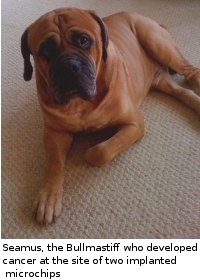|
CHIPPED PETS DEVELOP FAST-GROWING, LETHAL TUMORS
Owners, Medical Reports Point to Link Between RFID Chips and Cancers in Canines
 Highly aggressive tumors developed around the microchip implants of two American dogs, killing one
of the pets and leaving the other terminally ill. Their owners --- and pathology and autopsy reports --- have
suggested a link between the chips and the formation of the fast-growing cancers. Highly aggressive tumors developed around the microchip implants of two American dogs, killing one
of the pets and leaving the other terminally ill. Their owners --- and pathology and autopsy reports --- have
suggested a link between the chips and the formation of the fast-growing cancers.
In the town of Paeonian Springs, Va., a five-year-old male Bullmastiff named Seamus died in February, nine months
after developing a "hemangio-sarcoma" --- a rare, malignant form of cancer that strikes connective tissues and can
kill even humans in three to six months. The tumor appeared last May between the dog's shoulder blades where a
microchip had been implanted; by September, a "large mass" had grown with the potential to spread to the lungs,
liver and spleen, according a pathology report from the Blue Ridge Veterinary Clinic in Purcellville, Va.
Originally scheduled to receive just a biopsy, Seamus underwent emergency surgery. A foot-long incision was opened
to extract the 4-pound-3-ounce tumor, and four drains were needed to remove fluid where the tumor had
developed.
When Howard Gillis, the dog's owner, picked up his pet the following day, the attending veterinarian stunned him
with this question: Did you know your dog had been microchipped twice, and that both chips were in or around the
tumor?
"While we knew of one chip, which we had put in him at a free local county clinic, we knew nothing of a second
chip," Gillis said. "We believe one of them was put in Seamus by the breeder from whom we bought him when he was
about nine months old."
By December, the cancer was back --- and the energetic, playful 150-pound dog was huffing and puffing, struggling
to walk. Seamus "was 150 pounds of heart," Gillis said in a recent interview. "He wanted to live."
Gillis said he "got the microchip because I didn't want him stolen. I thought I was doing right. There were never
any warnings about what a microchip could do, but I saw it first-hand. That cancer was something I could see
growing every day, and I could see it taking his life ... It just ate him up." To keep his beloved dog from
suffering further, he had him put to sleep two months later.
 In Memphis, a five-year-old Yorkshire Terrier named Scotty was diagnosed with cancer at the
Cloverleaf Animal Clinic in December. A tumor between the dog's shoulder blades --- precisely where a
microchip had been embedded --- was described as malignant lymphoma. A tumor the size of a small balloon was
removed; encased in it was a microchip. In Memphis, a five-year-old Yorkshire Terrier named Scotty was diagnosed with cancer at the
Cloverleaf Animal Clinic in December. A tumor between the dog's shoulder blades --- precisely where a
microchip had been embedded --- was described as malignant lymphoma. A tumor the size of a small balloon was
removed; encased in it was a microchip.
Scotty was given no more than a year to live.
But the dog's owner, Linda Hawkins, wasn't satisfied with just a prognosis: She wanted to know whether the presence
of the microchip had anything to do with Scotty's illness. Initially, her veterinarian was skeptical that a chip
implant could trigger cancer; research has shown that vaccine injections in dogs and cats can lead to tumors.
In a December pathology report on Scotty, Evan D. McGee wrote: "I was previously suspicious of a prior unrelated
injection site reaction" beneath the tumor. "However, it is possible that this inflammation is associated with
other foreign debris, possibly from the microchip."
| 







 Highly aggressive tumors developed around the microchip implants of two American dogs, killing one
of the pets and leaving the other terminally ill. Their owners --- and pathology and autopsy reports --- have
suggested a link between the chips and the formation of the fast-growing cancers.
Highly aggressive tumors developed around the microchip implants of two American dogs, killing one
of the pets and leaving the other terminally ill. Their owners --- and pathology and autopsy reports --- have
suggested a link between the chips and the formation of the fast-growing cancers. In Memphis, a five-year-old Yorkshire Terrier named Scotty was diagnosed with cancer at the
Cloverleaf Animal Clinic in December. A tumor between the dog's shoulder blades --- precisely where a
microchip had been embedded --- was described as malignant lymphoma. A tumor the size of a small balloon was
removed; encased in it was a microchip.
In Memphis, a five-year-old Yorkshire Terrier named Scotty was diagnosed with cancer at the
Cloverleaf Animal Clinic in December. A tumor between the dog's shoulder blades --- precisely where a
microchip had been embedded --- was described as malignant lymphoma. A tumor the size of a small balloon was
removed; encased in it was a microchip.



